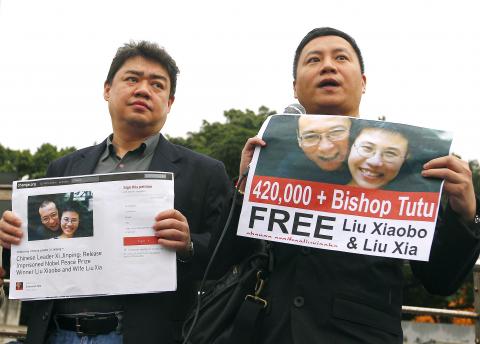As part of a globally coordinated effort to have imprisoned Chinese dissident and Nobel laureate Liu Xiaobo (劉曉波) released, exiled Chinese democracy activists Wang Dan (王丹) and Wuer Kaixi, accompanied by Taiwan Association for China Human Rights chairman Yang Hsien-hung (楊憲宏), delivered a petition signed by more than 600 Taiwanese to the Presidential Office, asking the office to forward it to the Chinese government.
Initiated by Nobel laureate Desmond Tutu in December last year, more than 400,000 people worldwide have signed the petition urging the Chinese government to release Liu immediately, and yesterday was the date set for delivery of the petitions to Chinese diplomatic posts around the world, Wuer Kaixi told a press conference in front of a monument to commemorate victims of the White Terror era on Ketagalan Boulevard in front of the Presidential Office yesterday morning.
“Today, people who are concerned about Liu and about the democratic movement in China are turning in petitions to Chinese consulates and embassies in their own countries, calling on China to release Liu,” Wuer Kaixi said. “Since there’s no Chinese representation here in Taiwan, we are turning in our petition to the Presidential Office, hoping that it will forward it to Beijing.”

Photo: Pichi Chuang, Reuters
Wuer Kaixi said that while President Ma Ying-jeou (馬英九) had once urged Beijing to set Liu free, it was unfortunate that no Chinese Nationalist Party (KMT) lawmakers had accepted his invitation to attend the event.
“However, this is an opportunity for Ma to show he really means what he said,” Wuer Kaixi said. “The difference between Taiwan and China is that we’re giving Liu our support, while China threw him in jail.”
Wang, who is a personal friend of Liu, said that Liu has always been concerned about Taiwan’s development and considers himself a friend of Taiwan, although he has never set foot in the nation.
“As a nation that stands behind the universal values of human rights, I hope that Taiwanese will not forget their obligations to help promote human rights protection around the world, including in China,” Wang said. “It’s especially important for Taiwan, because it would not be good for cross-strait exchanges if China remains a superpower in human rights violations.”
Yang said that human rights advocates were looking to push for legislation on political asylum and to amend the Act Governing Relations Between the Peoples of the Taiwan Area and the Mainland Area (台灣地區與大陸地區人民關係條例) to include clauses on human rights protection.
Separately yesterday, the Democratic Progressive Party (DPP) urged Ma to sign the petition demanding Beijing release Liu.
“Ma, as well as anyone who upholds the values of freedom, peace and democracy, should join more than 400,000 people from about 130 countries and support the petition drive,” DPP spokesperson Lin Chun-hsien (林俊憲) said.
Additional reporting by Chris Wang

CHAOS: Iranians took to the streets playing celebratory music after reports of Khamenei’s death on Saturday, while mourners also gathered in Tehran yesterday Iranian Supreme Leader Ayatollah Ali Khamenei was killed in a major attack on Iran launched by Israel and the US, throwing the future of the Islamic republic into doubt and raising the risk of regional instability. Iranian state television and the state-run IRNA news agency announced the 86-year-old’s death early yesterday. US President Donald Trump said it gave Iranians their “greatest chance” to “take back” their country. The announcements came after a joint US and Israeli aerial bombardment that targeted Iranian military and governmental sites. Trump said the “heavy and pinpoint bombing” would continue through the week or as long

TRUST: The KMT said it respected the US’ timing and considerations, and hoped it would continue to honor its commitments to helping Taiwan bolster its defenses and deterrence US President Donald Trump is delaying a multibillion-dollar arms sale to Taiwan to ensure his visit to Beijing is successful, a New York Times report said. The weapons sales package has stalled in the US Department of State, the report said, citing US officials it did not identify. The White House has told agencies not to push forward ahead of Trump’s meeting with Chinese President Xi Jinping (習近平), it said. The two last month held a phone call to discuss trade and geopolitical flashpoints ahead of the summit. Xi raised the Taiwan issue and urged the US to handle arms sales to

State-run CPC Corp, Taiwan (CPC, 台灣中油) yesterday said that it had confirmed on Saturday night with its liquefied natural gas (LNG) and crude oil suppliers that shipments are proceeding as scheduled and that domestic supplies remain unaffected. The CPC yesterday announced the gasoline and diesel prices will rise by NT$0.2 and NT$0.4 per liter, respectively, starting Monday, citing Middle East tensions and blizzards in the eastern United States. CPC also iterated it has been reducing the proportion of crude oil imports from the Middle East and diversifying its supply sources in the past few years in response to geopolitical risks, expanding

OTHER OPTIONS: Given possible US intervention and Taiwanese counterattacks, China might opt to blockade Taiwan or take its outlying islands instead of an all-out invasion A US think tank has urged Taiwan to adopt a “hellscape” strategy that would flood the Taiwan Strait with drones and other uncrewed systems to deter invasion by China. In its report, Hellscape for Taiwan, published on Thursday, the Center for a New American Security said Taipei’s asymmetric defense approach — often described as a “porcupine strategy” — needs to evolve to keep pace with the growing capabilities of the Chinese People’s Liberation Army. The “hellscape” strategy involves saturating the air and waters around Taiwan with thousands of drones and other platforms capable of striking invading forces from multiple domains at once. Long-range